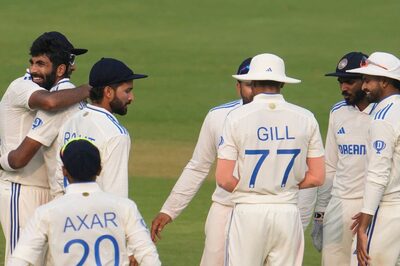
views
Something must be rotten in the state of Uttar Pradesh. I bet a lot of people in West Bengal must be wondering about this right now. We have already been through five phases of elections in India’s most populous state. And yet, where are the political murders? Where are the milling crowds of ruling party workers who will surround opposition villages and teach them a lesson? Where is the smell of gunpowder? And why is there no smoke rising from bombs thrown in the countryside?
We get to hear a lot about unemployment nowadays. What do the unemployed in Uttar Pradesh do all day? Do they take their elections seriously or not?
Unfortunately for me and my fellow Bengalis, the answer to all of those questions about the people of Uttar Pradesh is quite distressing. They are not the weird ones, we are. Political violence during elections is not supposed to happen, nor is it common. In fact, it rarely happens anywhere else in the country. And, therefore, instead of pointing fingers at other people, we need to look within and ask ourselves some hard questions.
Incidentally, West Bengal is also having a big round of civic polls right now. The ruling party is widely expected to win around 100 percent of the seats. And perhaps even a little more than that, if possible. Leaving that aside for a moment, what matters is that these elections are happening on the usual ‘Bengal model.’ That means opposition party workers and leaders are being beaten, sometimes even killed. Even journalists and polling officials are not safe. Honestly, this would have happened just as much even if we were having a clutch of college student union elections right now. Be it in the cities or in the countryside, no election is too small to turn violent in West Bengal.
Who can forget what happened last year during state assembly elections in West Bengal? Let alone opposition workers, the mobs even attacked police, CRPF and CISF personnel, even tried to snatch their weapons. What will happen to you once the central forces leave, the Chief Minister asked mockingly at one rally. For added effect, she even made a gesture showing the opposition begging for their lives. After the results came out, it seems ruling party workers proved that this was not just empty rhetoric. The ‘investigations’ are still going on, but we have high hopes.
Right now, West Bengal is seeing a bit of stir over the death of an individual, allegedly thrown off a roof by the state police and murdered. It so happens that the deceased belonged to a certain community that is believed to have fully consolidated its votes behind the ruling party in the last elections. This means that the state government has had to take the unusual step of allowing street protests, instead of the expected brutal crackdown. Also, the deceased had links with Communist parties, which command the loyalty of large sections of the media. As a result, the media has had to do the right thing by not dehumanising the victim. His name and face have appeared in newspapers, television channels and social media. In West Bengal, at least some lives still matter.
The state government may be on the defensive on this one. But we know this is temporary. Last year, BJP leaders had taken out a procession in Kolkata with the body of one of their candidates who had been killed in the post-poll violence. How dare you do this, the Chief Minister roared. “What if I told the municipal corporation to dump dead dogs outside your house,” she added. In the recent case, that kind of swagger might be missing. Because of the religious identity of the victim, she does not have her usual media, intellectual and ‘fact-checker’ allies by her side. But they will return. They will justify themselves by saying that they are doing this to stop Modi and BJP.
But there is a deeper distinction that emerges when you compare West Bengal with Uttar Pradesh, or West Bengal to almost any other state for that matter. Every election campaign will have some empty rhetoric and some entertaining jibes at the other side. But in Uttar Pradesh, there is more than just that. The ruling BJP is contesting elections on efficient delivery of welfare schemes such as free rations, highway construction and improved law and order. They also argue that having the same party in power at the state and the center will make development work smoother. The opposition Samajwadi Party counters this by talking about jobs, promising to bring back a popular pension scheme for government employees, and more. This is what an election is supposed to be about.
Now let me ask you this. Could you name a single issue that came up during the elections in West Bengal last year? I am not talking about “issues” such as Gujaratis taking over Bengal, with their alleged lack of appreciation for the great poets of the Bengali language. I am talking about real issues. Who is to blame for the collapse of industry in Bengal? Why is Bengal one of the poorest states in India? Who is to blame for the bad infrastructure, and the inability to attract investment? You could not possibly blame this on the BJP, which has not been in power even for a day. The TMC has already been in power for ten years. Even if they choose to distance themselves from the legacy of all the other “liberal” parties that have ruled the state in the past, they should talk about how they plan to make things better. At least in their third term!
That is when you realise what is really happening. Elections in West Bengal are a blood sport. Don’t just focus on the word ‘blood.’ Also focus on the word ‘sport.’ It is only a game. The election in West Bengal does not mean anything at all.
Don’t get me wrong. Ask anyone who has ever played a sport. It takes lots of hard work, dedication, and practice to beat the other team. It is fascinating to watch. Emotions run high. But ultimately, you are not actually fighting for anything. It is just entertainment.
In fact, I am not the one telling you that. The Chief Minister already told you that. Remember “khela hobe”?
That is what the election in West Bengal was, a “khela.” We saw two teams facing off against each other. People gathered to watch. The stronger team wrestled its opponents to the ground. We were promised entertainment and we got that.
Suppose I gave you two slogans side by side, both in Bengali. One is “korbo lorbo jeetbo re” (we will do it and we will win). Another is “khela hobe” (start the game). Could you tell which slogan belongs to the TMC and which one to the Kolkata Knight Riders?
Also Read: OPINION: Have You Wondered What ‘Khela Hobe’ Means?
Significantly, however, the TMC is not a cricket team. In Uttar Pradesh, the BJP talks of “double engine ki sarkar.” The BJP is asking voters to choose close cooperation between state and center, which they insist will lead to better development outcomes. Five years ago, the ruling SP went to campaign in Uttar Pradesh with the slogan “kaam bolta hai.” On the other hand, Mamata Banerjee only promised to defeat the opposition parties in the election, which she already did. So she has already fulfilled her campaign promise, if you can even call it one. In 2026, the TMC can go back to the voters of Bengal and promise to defeat the opposition once again. They will have a number of cricketing slogans to choose from.
After the election results in West Bengal were announced, the Chief Minister declared that her “next” target would be economic development of the state. Next? It is heartbreaking to realize that economic development did not even come up as an issue during ten continuous years of her rule in the state. Also, note that she said this as she was trying to pivot towards national politics. In other words, the Chief Minister knows that economic growth might not be an issue in Bengal, but people of other states will surely ask about it. Whither, Bengal?
Recently, Mamata Banerjee went to campaign in Goa, seeking to establish a bridgehead for TMC there. Incidentally, Goa is the state with the highest per capita income in India, while Bengal has one of the lowest. But, Mamata Banerjee argued, Bengal is a “strong” state. This is one of the scariest things I have ever heard.
If you follow the politics of West Bengal closely, you will know that much of it is driven by a sense of superiority over people of other states. But whatever was the imaginary basis for that, it has worn thin. Our elections have hollowed out. Our intellectuals are reduced to propaganda. And the proletariat is reduced to street battles. It would make sense to become humble and try to follow better examples.
Abhishek Banerjee is an author and columnist. He tweets @AbhishBanerj. The views expressed in this article are those of the author and do not represent the stand of this publication.
Read all the Latest Opinion News and Breaking News here


















Comments
0 comment